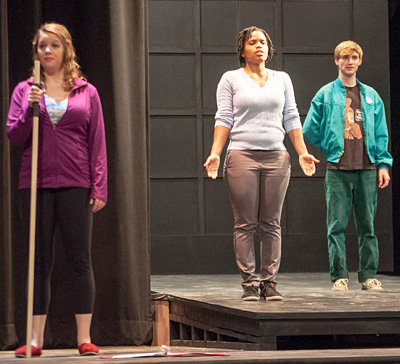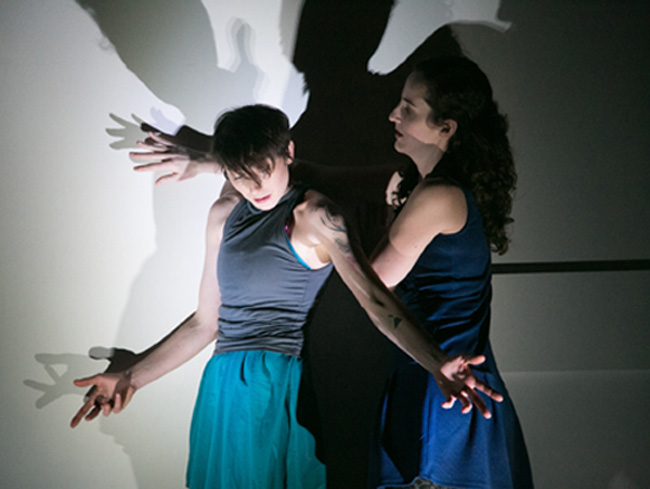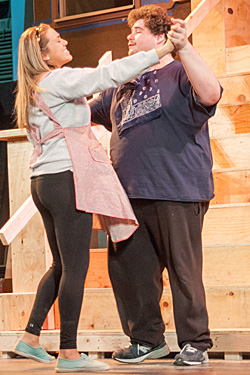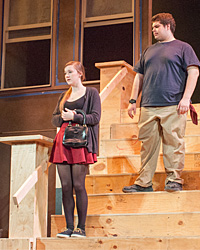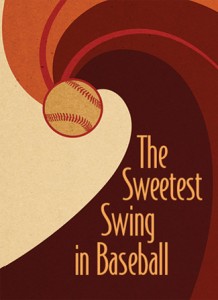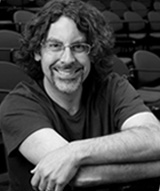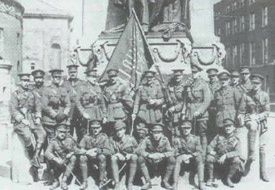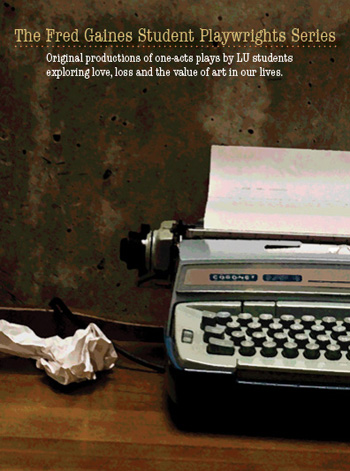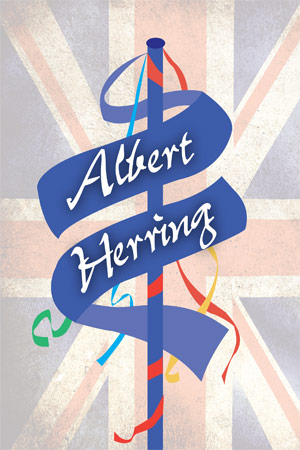It’s easy to understand why Richmond Frielund is a fan of “do-overs.” Early in his career he was the beneficiary of one.
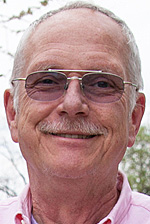
Frielund, who has helped stage more than 100 Lawrence University productions, and Richard Yatzeck, who led Lawrence students on a dozen summer-long treks through Eastern Europe, will be honored Sunday, June 15 as retiring faculty members for their combined 82 years of teaching at the college’s 165th commencement.
Frielund, associate professor of theatre arts, and Yatzeck, professor of Russian, will be recognized with professor emeritus status and awarded honorary master of arts degrees, ad eundem, as part of the graduation ceremonies on Main Hall green.
Five years after joining the Lawrence theatre arts department as technical director in 1979, Frielund left for what he thought was a better opportunity at the University of North Carolina-Greensboro. It turned out to be a less-than-ideal fit.
“I was thankful I saw my job listing and I reapplied for my old job and wound up getting hired back,” said Frielund, who rejoined the college in the fall of 1985.
In a largely behind-the-scenes career spanning a total of 44 years, including 10 before coming to Lawrence, Frielund has directed set and lighting design for more than 100 Lawrence play, opera, musical and dance productions and has assisted with more than 200 others outside the college, including concerts for Elvis Presley, Bon Jovi and Kenny Chesney, several touring Broadway musicals, including “Phantom of the Opera” and “Wicked” and a visit by then President George W. Bush to Appleton, for which he received a White House citation of thanks. Unfortunately his name was misspelled on it.
“I have found fulfillment in doing some shepherding,” said Frielund, a native of Duluth, Minn. “You’re in the back and you just keep things going. I take great pleasure in coming up with something and seeing how other people can use it well.”

Among all the productions he’s had a hand in, three in particular still stand out in Frielund’s mind: A 1980 performance of “The Crucible,” 1998’s “Sweeney Todd” and a 1999 staging of “Translations,” which was selected to go to the American College Theatre Festival.
“For the production of ‘The Crucible,’ Campbell Scott (’83) played John Proctor when he was 19 years old. That was the first big part he’d had, but that’s not the only reason I remember that show,” said Frielund. “I had built this ceiling piece. It was sitting on the floor and as we hoisted it up, part of it stayed in the air and the other part flopped back down on the floor. It wasn’t quite back to square one, but it certainly was a teaching moment for us all.
“The single, salient most significant memory of my career at Lawrence was in 1998,” Frielund added. “We did a production of ‘Sweeney Todd,’ and this was the first time we did a rehearsal at Bjorklunden. There were all of these really good singers rehearsing and I walked in the door and heard ‘Swing your razor high, Sweeney,’ and this huge, huge beautiful, glorious sound hit me. I thought to myself, ‘This is what Lawrence can really do well.’”
Frielund says it’s the beginnings and endings of a term or academic year that turn him reflective.
“I can’t tell you how many times on a day when a term is starting or its the end of the year, I will have a very warm feeling for this place. I just stop and think, ‘Thank God I’m here.’ This place doesn’t operate like a lot of institutions and for that I’m thankful.”
“The times I’ve spent working with students in the shop, painting scenery, showing kids how to build things, how to focus lights, those are my fondest memories.”
— Associate Professor Richmond Frielund
Prior to Lawrence, Frielund taught for two years at the University of Michigan, where he once had a freshman in a dance class by the name of Madonna Louise Ciccone, who “weighed 85 pounds soaking wet, but she was a really good dancer, to what extent she bothered showing up.” He wound up giving her a ‘C.’
“She had other interests,” recalled Frielund, 64. “She didn’t come back to school and I heard she’d gone off to New York. I had no idea that the Madonna on the radio was the same person I had in class until I read a magazine article about her.”
Brushes with celebrity aside, thoughts of working with students in the theatre department’s back corners are what make Frielund smile.
“The times I’ve spent working with students in the shop, painting scenery, showing kids how to build things, how to focus lights, those are my fondest memories.”
Professor of theatre arts Timothy X. Troy and Frielund’s department colleague the past 17 years, said Frielund believed the study of theatre in performance and design anchored a student’s engagement in the liberal arts generally.
“Rich’s tradition of a fully integrated approach to production and curious exploration of each play’s themes and social context will mark our department well into the future,” said Troy. “Rich taught us all to respect a developmental model of theatre education: let success build upon success until students integrate an ever-widening understanding of the richness and complexity of the theatre tradition.”
In retirement, Frielund will be involved in December performance of “The Nutcracker” at the Fox Cities Performing Arts Center. He also hopes to do some teaching at Appleton’s Renaissance School.
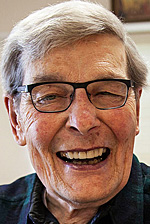
Yatzeck, 81, began organizing every-other-year trips to Russia and Eastern Europe with former professor George Smalley shortly after he joined the faculty in 1966. Traveling in seven Volkswagen buses, as many as 35 students would participate in the trips throughout the continent.
“The (Lawrence) authorities at that time thought it would be a good idea. I’m not sure why they did because everybody else asked us if we’d get back alive,” said Yatzeck, who calls the biennial trips the highlight of his teaching career. “They were certainly good for my oral Russian.”
Those trips — as well as two stints (1991, 1997) as director of the ACM’s study-abroad program in Krasnodar — inspired him to chronicle his experiences in the 2012 book “Russia in Private,” a collection of his observations of Russian life.
During one of the longest teaching tenures in Lawrence history — 48 years — Yatzeck taught the finer points of Tolstoy, Pushkin and Dostoevsky. A self-proclaimed non-fan of the modern world, Yatzeck says he would have preferred living in the time of the writers he now teaches.
“Basically, the only way to amuse yourself was to read and that’s what I’ve done all my life and so in some ways I feel as if I still live in the 19th century,” said Yatzeck, who has never owned what most would consider a present-day necessity — a television. “Part of being happy teaching at Lawrence is a lot of my work is spent reading and preparing for classes and the thinking that goes along with it. When you read a book you have to make your own pictures so that you’re exercising your imagination. What is this guy saying, what would it look like.”
A close second to his passion for Russian literature is his love of the outdoors. An avid hunter and fisherman, early in his teaching career Yatzeck was known to occasionally wear his hunting boots to class for a quick jaunt to the woods or the lake in the fall afternoon’s fading light with his Main Hall colleagues Peter Fritzell and Michael Hittle of the English and history departments, respectively. The three were dubbed “The Rod and Gun Club” by former Lawrence historian Anne Schutte.
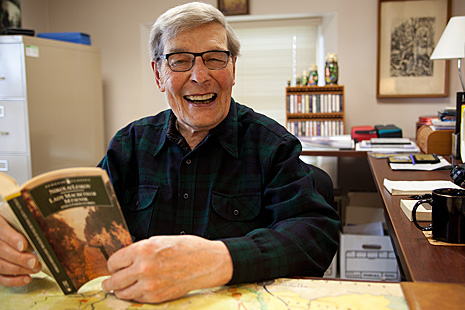
Fritzell said the three friends “came to know each other as only outdoorsmen can.”
“Sleeping in tents together, discussing poems, novels and historical events around campfires, in boats and duckblinds, we engaged in fairly high-drawer philosophical arguments, enjoying gourmet lunches on tailgates of trucks with our bird dogs or ice-fishing on Lake Winnebago,” said Fritzell. “Dick would often pull from his scholar’s shoulder-bag a bottle of the very best Slivovitz and we’d toast the end of the day, the placing of the last tipup, or, if we were lucky, the first fish on the ice.”
Yatzeck has always maintained his perspective and never considered teaching as merely paying for the time that he could go hunting or fishing.
“They are quite different things. The business about hunting is you switch off your intellect and you listen to your senses. Something smells or you hear or taste something and your intellectual powers are in abeyance and that’s a nice rest. But that isn’t how you teach.”
“What I like best is when one of the students teaches me something I’ve never noticed. That, I feel, is the height of teaching, when you can learn from your students.”
— Professor Richard Yatzeck
Yatzeck’s scholarly work includes a dozen published poems, but he also has written extensively about the outdoors, including 11 articles for Gray’s Sporting Journal, the New Yorker of outdoor literature. His first book, 1999’s “Hunting the Edges,” is a collection of his musings about the philosophical, not the practical, aspects of the outdoors.
In a career spanning nearly five decades, Yatzeck says he never counted the days or the years, they “just added up by themselves.”
“Monday has never seemed a time to curse to me. I never felt I was going to a job,” said Yatzeck, who got hooked on Russian as a German-speaking Fulbright Fellow in 1955 after meeting a red-headed Russian woman in Hamburg, Germany. “What I like best is when one of the students teaches me something I’ve never noticed. That, I feel, is the height of teaching, when you can learn from your students.”
In addition to more trips to the lake and woods and visits with children in Chicago, St. Louis and London, Yatzeck hopes to pen a third book in retirement about his youth in the rural village of Genesee, Wis.
“I have always looked back at that as a model. I’ve written a couple of short pieces about individuals who lived in that village but I’d like to write some kind of account of life at that time. In 80 years a great deal has changed.”
About Lawrence University
Founded in 1847, Lawrence University uniquely integrates a college of liberal arts and sciences with a nationally recognized conservatory of music, both devoted exclusively to undergraduate education. It was selected for inclusion in the Fiske Guide to Colleges 2014 and the book “Colleges That Change Lives: 40 Schools That Will Change the Way You Think About College.” Individualized learning, the development of multiple interests and community engagement are central to the Lawrence experience. Lawrence draws its 1,500 students from nearly every state and more than 50 countries.
